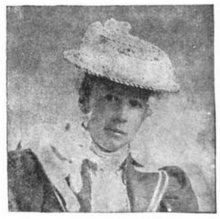Lily Dougall
Lily Dougall | |
|---|---|
 Lily Dougall, from a 1900 publication. | |
| Born | 1858 Montreal, Canada East |
| Died | 1923 |
| Occupation | Writer |
| Nationality | Canadian |
Lily Dougall (1858–1923) was a Canadian writer[1] and feminist.[2]
Biography[edit]
Born into an evangelical Presbyterian newspaper family, Dougall's liberal views often conflicted with her religious upbringing. She was the youngest of the nine children. Although born in Montreal, Canada East, she was educated in New York City and at both the University of Edinburgh and St. Andrew's University in Scotland.[3] While in Edinburgh, she lived with her aunt.[4] She lived in Montreal from 1897 to 1903[5] until she finally settled down in Cumnor, near Oxford,[4] in 1911.[5] While there, she lived her life with her lesbian partner, Sophie Earp.[6] In Cumnor, she became the center of a group that was dedicated to thought and conversation.[4] This was similar in its views to that of her first essay, Pro Christo et Ecclesia (1900).[3][4]
Her debut novel, Beggars All, was published in 1892 followed by nine other novels.[5] Her contemporaries thought her novels were "well-received" and they have "been widely read far from the shores of her native land".[7] She also did write a novel prior to Beggars All, Lovereen, A Canadian Novel, that was published under a male pseudonym.[1] She also published one volume of short stories and eight books of religious philosophy.[5] Four of Dougall's novels have Canadian settings spanning from western British Columbia to Eastern Quebec to Atlantic Prince Edward Island.[3] What Necessity Knows, The Zeitgeist, The Mermaid: A Love Tale and The Madonna of a Day: A Study.[4] Her fiction is characterized by twists of fate, disguise, hidden identity and disillusioned love.[3] More noteworthy, however, her work is known for its exploration of religious and philosophical themes.[5] Many of her protagonists are strong, independent females who are typically drawn to the idea of egalitarian marriage.[3]
Works[edit]
- What Necessity Knows (1893)
- The Zeit-Geist (1895)
- The Mermaid (1895)
- A Dozen Ways Of Love (1897)
- The Mormon Prophet (1899)
- The Summit House Mystery (1905)
References[edit]
- ^ a b McEntyre, M. (2007). Religious Experience and the New Woman: The Life of Lily Dougall. Journal of American History, 94(3), 943-944. Retrieved from Academic Search Complete database.
- ^ French, William. "A Pithy and Provacative Look and More than 200 Significant Canadian Novels. A Pundit's source-book A READERS GUIDE TO THE CANADIAN NOVEL." The Globe and Mail. 30 Jan. 1982, Canadian Newsstand Major Dailies, ProQuest. Web. 16 Sept. 2010.
- ^ a b c d e Marilyn, Rose. "Dougall, Lily" The Oxford Companion to Canadian Literature. Eugene Benson and William Toye. Oxford University Press 2001. Oxford Reference Online. Oxford University Press. Douglas College. 16 September 2010 Link[permanent dead link]
- ^ a b c d e Story, Norah. The Oxford Companion to Canadian History and Literature. Toronto: Oxford University Press, 1967.
- ^ a b c d e William, Toye, ed. The Concise Oxford Companion to Canadian Literature. Toronto: Oxford University Press, 2001.
- ^ Richardson, L. (2009). Religious Experience and the New Woman: The Life of Lily Dougall. Victorian Studies, 51(4), 729-732. Retrieved from Academic Search Complete database.
- ^ Hopkins, J. Castell (1898). An historical sketch of Canadian literature and journalism. Toronto: Lincott. p. 127. ISBN 0665080484.
Further reading[edit]
- Joanna Dean, Religious Experience and the New Woman: The Life of Lily Dougall (Bloomington: Indiana University Press, 2007).
External links[edit]
- "Lily Dougall". Dictionary of Canadian Biography (online ed.). University of Toronto Press. 1979–2016.
- Works by Lily Dougall at Project Gutenberg
- Works by Lily Dougall at Faded Page (Canada)
- Works by or about Lily Dougall at Internet Archive
- Works by Lily Dougall at LibriVox (public domain audiobooks)

- Dougall at SFU Digitized Collections, Simon Fraser University, Coll. Canada's Early Women Writers (with a photograph)
- 1858 births
- 1923 deaths
- 19th-century American women writers
- 19th-century American writers
- 19th-century Canadian essayists
- 19th-century Canadian novelists
- 20th-century Canadian novelists
- 20th-century Canadian women writers
- 20th-century Canadian essayists
- Canadian women essayists
- Canadian women novelists
- Writers from Montreal
- 19th-century Canadian women writers
- Canadian emigrants to the United States
